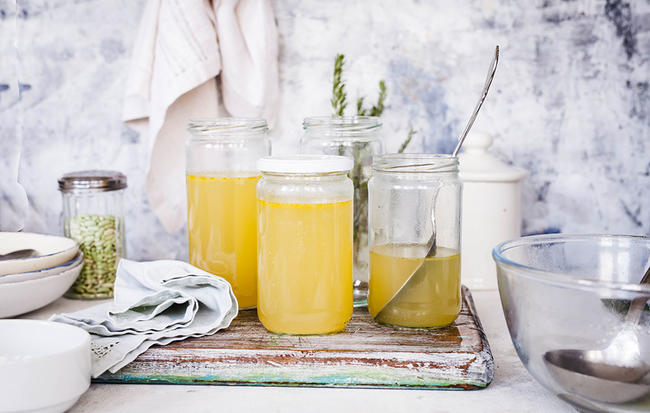Currently millions of peoplw suffer from digestive diseases, including celiac disease, irritable bowel syndrome, and lactose intolerance, as well as general gassiness and bloating. Leaky gut syndrome is another common digestive disorder that occurs when the digestive tract becomes damaged, allowing proteins like gluten, bad bacteria, and undigested food particles to pass into the bloodstream. Over time, these particles cause inflammation, an immune reaction, and continued poor digestion.
But no matter what the specific condition, it’s safe to say that there are a lot of people feeling uncomfortable each time they eat—and looking for a quick solution!
Singling out the root cause of all those tummy troubles can be difficult, but it’s likely that for most of us, our diets and lifestyles are to blame. The typical Western diet, heavy in refined carbohydrates, unhealthy fats, and low-quality protein sources—with very little in the way of fresh fruits and vegetables—can wreak havoc on our bodies and, in particular, on our digestive systems. But the good news is that, while bad food choices can cause major damage to the digestive system, good food choices can have the opposite effect. By introducing certain foods into your diet, you can begin repairing your gut and healing digestion naturally. Try my favorite five foods to start feeling better fast!

Bone broth
Hands down, bone broth is my top food for healing digestion and leaky gut. But be clear: I’m not talking about the canned stuff you buy at the grocery store to use in recipes or make soup. I’m talking about bone broth the way our ancestors made it: with marrow, tendons, ligaments, and every other inedible part of the animal being boiled and then simmered over several days.
The simmering causes the bones and ligaments to release healing compounds like collagen, which can totally transform your digestive health. Collagen protects and soothes the digestive tract’s lining—so much so that it sometimes helps people with food allergies and sensitivities begin to tolerate those foods.
As an added bonus, if you’ve been suffering from skin issues as a result of poor digestion, collagen is amazing at improving skin’s elasticity (hello, younger you) and reducing cellulite.

Coconut products
Coconut products—including coconut oil, coconut milk, and coconut water—are excellent for healing digestion and maintaining a healthy gut. Because they help the body absorb fat-soluble vitamins, calcium, and magnesium, coconut products help keep things flowing smoothly.
Coconut oil and coconut milk are also loaded with electrolytes and healthy, easily digestible fats, which keep the digestive tract well hydrated, reducing the risk of constipation. They also provide double the digestive healing power: Because of their natural antifungal properties, coconut oil and coconut milk are potent bad-bacteria and candida (yeast) fighters. Candida imbalances are known to decrease stomach acid, which also leads to poor digestion and inflammation. To reap these benefits, try using coconut oil instead of extra-virgin olive oil in your recipes or adding coconut milk to your morning coffee.

Probiotic foods
When it comes to healing digestion, probiotic foods have your back. Probiotics are bacteria that line your digestive tract and support your body’s ability to absorb nutrients and fight infection. In fact, there are actually 10 times more probiotics in your gut than there are cells in your body. These little do-gooders make sure there is a healthy balance between the good and bad bacteria in your gut. It’s when the imbalance tips too far in favor of the bad gut bugs that digestive issues (like IBS or poor digestive function) crop up.
Luckily, foods rich in probiotics can right those wrongs. Fermented foods—think sauerkraut, kimchi, kefir, miso, and natto—are loaded with the stuff, providing even more probiotic goodness than a supplement. They help your body maintain healthy bowel movements and act as a gatekeeper to your bloodstream, rejecting unsavory characters. They also help heal leaky gut and constipation. Making smoothies with kefir instead of yogurt or adding a serving of kimchi to your dinner are simple ways to work fermented foods into your diet so they can help ease digestion woes.

Kombucha
While it’s easy to think that kombucha is just another hipster fad, the fermented drink, made from black tea and sugar, has actually been around for thousands of years. Kombucha is packed with high levels of healthy acids, probiotics, and enzymes. These help kombucha not only help heal the digestive system, but also protect it from leaky gut and other issues. One study even found that in mice with stomach ulcers, four days of the frizzy drink was as effective as a prescription medication at treating the ulcers.
Like its other probiotic-rich companions (see above), kombucha will keep yeast from overpopulating and provide good bacteria to repopulate the gut. And in case you needed one more reason to load up on this super soda alternative, remember that kombucha is also super energizing. You can sip on it to come out of a mid-afternoon slump and heal your digestive system at the same time.

Sprouted seeds
Sprouted seeds like chia, flax, and hemp are more than just trendy ingredients at your local salad bar. They’re tiny powerhouses packed with fiber—a nutrient that happens to be awesome for digestion.
Because they’re so high in fiber (chia packs in nearly 11 grams per ounce), sprouted seeds keep your bowels moving regularly and promote healthy stools. The seeds also protect your digestive lining, keeping unwanted particles out while letting all the important vitamins and nutrients in. Adding these seeds to meals also alleviates gut inflammation, soothing digestion for people with Crohn’s disease and other ailments. And if these seeds weren’t cool enough, they also work as food for the good bacteria in your body, giving them more ammunition to kick out bad bacteria.












